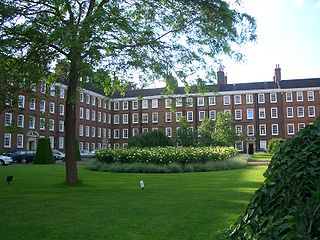John Bennet (10 January 1628 – 16 May 1663) was an English landowner and politician who sat in the House of Commons from 1660 to 1663.

The House of Commons of England was the lower house of the Parliament of England from its development in the 14th century to the union of England and Scotland in 1707, when it was replaced by the House of Commons of Great Britain. In 1801, with the union of Great Britain and Ireland, that house was in turn replaced by the House of Commons of the United Kingdom.
Bennet was the eldest surviving son of John Bennet, merchant of St. Stephen's Walbrook, London and his wife Joane Mill, daughter of William Mill of St. Clement Danes. His father died in 1631. He was a student of Gray's Inn in 1642. In 1652 he bought Great Abington from the Earl of Northampton. He was a J.P. for Cambridgeshire from 1657 until his death. In 1660, he was elected Member of Parliament for Bridgnorth in the Convention Parliament. He was a Gentleman pensioner from June 1660 to 1662 and a commissioner for assessment from September 1660 to 1662. In 1661, he was re-elected MP for Bridgnorth for the Cavalier Parliament. He was a gentleman of the privy chamber and also commissioner for corporations from 1662 until his death. [1]

The Honourable Society of Gray's Inn, commonly known as Gray's Inn, is one of the four Inns of Court in London. To be called to the bar and practise as a barrister in England and Wales, a person must belong to one of these Inns. Located at the intersection of High Holborn and Gray's Inn Road in Central London, the Inn is both a professional body and a provider of office accommodation (chambers) for many barristers. It is ruled by a governing council called "Pension", made up of the Masters of the Bench, and led by the Treasurer, who is elected to serve a one-year term. The Inn is known for its gardens, or Walks, which have existed since at least 1597.
Bridgnorth was a parliamentary borough in Shropshire which was represented in the House of Commons of England from 1295 until 1707, then in the House of Commons of Great Britain until 1800, and in the House of Commons of the Parliament of the United Kingdom from 1801 until its abolition in 1885.

The Convention Parliament followed the Long Parliament that had finally voted for its own dissolution on 16 March that year. Elected as a "free parliament", i.e. with no oath of allegiance to the Commonwealth or to the monarchy, it was predominantly Royalist in its membership. It assembled for the first time on 25 April 1660.
Bennet died at the age of 35 and was buried in the Mercers’ Chapel, London. [1]
Bennet married Elizabeth Whitmore, daughter of Sir Thomas Whitmore, 1st Baronet of Apley Park, Shropshire on 5 April 1654 and had one son who was later MP for Newton. [1]
Sir Thomas Whitmore, 1st Baronet was an English politician who sat in the House of Commons of England between 1640 and 1644. He supported the Royalist side in the English Civil War.

